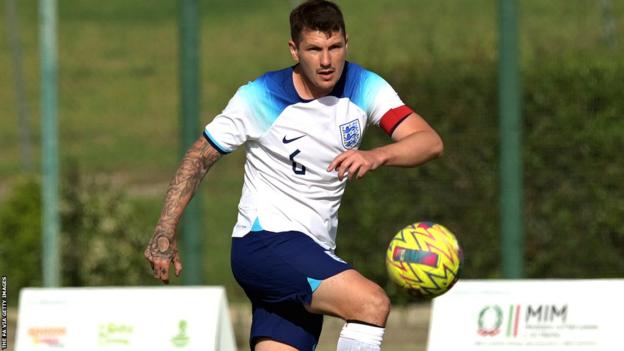Matt Crossen’s journey from a stroke-induced paralysis to captaining England’s cerebral palsy football team is a testament to his resilience.

Ten years ago, at 23, Crossen suffered a stroke that left him unable to walk, read, or write. Yet, even in the hospital, football remained his singular focus, propelling him through a remarkable recovery.
Crossen’s return to the pitch, after just a month and a half of intensive physical therapy, defied the odds. The former semi-professional player, now 34, underwent a significant identity shift from a highly rated youngster with dreams of becoming a professional footballer to embracing his status as a Para-athlete.
As the captain of England’s cerebral palsy team, Crossen leads a squad of seven players, navigating the unique challenges posed by neurological impairments. The team reached the finals of the cerebral palsy Euros in Sicily, demonstrating the adaptability and resilience of the players.
While the physical impact of Crossen’s stroke persists, including lingering pins and needles on his left side, the mental battle has been equally significant. The transition from the dashed dreams of a professional footballer to a Para-athlete has required mental strength and adjustment.
Dr. Jamie Barker, England’s Para-football psychologist, emphasizes the profound effects of such transitions on a player’s identity. For Crossen, the mental battle extended beyond physical recovery, as he grappled with doubts and uncertainties about fitting into the Para-football environment.
Despite these challenges, Crossen’s dedication to football propelled him forward. His role as England’s captain for the past six years speaks volumes about his leadership and resilience. He encourages his teammates by emphasizing that pressure is a privilege and that challenges should be embraced.
The broader landscape of Para-football has undergone positive changes in recent years. Efforts to create a person-centered approach, foster open environments, and address mental health concerns within the teams reflect a shift towards a more supportive culture.
Catherine Gilby, the FA’s Head of Para Performance, underscores the importance of creating a safe and open environment where players can discuss their challenges and access support. Initiatives like player representative groups and multi-squad camps contribute to building camaraderie among players with different impairment categories.
While England’s cerebral palsy team faced disappointment in the Euros final against Ukraine, losing 3-0, the journey itself is a victory. Crossen reflects on his stroke, recognizing the lost potential but also acknowledging the gains made in his journey. His attitude of working with what one has left serves as an inspiration, especially for young players facing similar challenges.
As Crossen continues to lead England’s cerebral palsy team, his story resonates as a testament to the power of determination, adaptability, and embracing one’s journey, no matter how unexpected the path may be.






